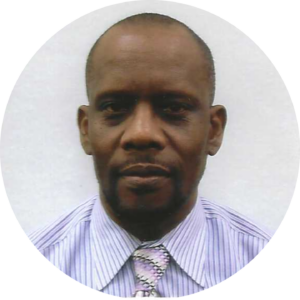As a member of the Senior Executive Service, Mr. Hawkins heads the U.S. National Science Foundation’s Research Infrastructure Office (RIO). RIO is responsible for the development and implementation of all policies and procedures related to agency-wide oversight for the design, construction, and operation of major multi-user research facilities. These include telescopes, particle detectors, mobile research platforms and distributed observatories which cost more than $100 million to construct. In addition, RIO is NSF’s primary resource for project management good practice and facilitates the sharing of lessons learned and good practices from previous projects.
Mr. Hawkins has a B.S. in Civil Engineering from the University of Maine, and a master’s degree in International Policy and Practice from the George Washington University. He first came to NSF in 2008 as a Program Officer in the Division of Ocean Sciences.
Dr. Roberts is the Deputy Chief Officer for Research Facilities at the U.S. National Science Foundation (NSF). He assists with the formulation of the agency’s goals and priorities with respect to major and mid-scale research infrastructure and works with the Chief Officer for Research Facilities (CORF) to advise the Director on all aspects of research infrastructure. He contributes to strategic portfolio planning for research infrastructure and implements the policies and practices necessary for the success of research infrastructure in the NSF context. At NSF, he previously served as a Program Director in Division of Biological Infrastructure (DBI) in the Directorate for Biological Sciences (BIO) where he managed awards to the National Ecological Observatory Network (NEON) and the Integrated Digitized Biocollections (iDigBio) hub. He also managed the Collections in Support of Biological Research (CSBR) and the Advancing Digitization of Biodiversity Collections (ADBC) programs. In addition to program management, he has worked on initiatives to increase the participation of under-served individuals in the biodiversity sciences and biodiversity informatics.
As a member of the Senior Executive Service, Mr. Hawkins heads the U.S. National Science Foundation’s Research Infrastructure Office (RIO). RIO is responsible for the development and implementation of all policies and procedures related to agency-wide oversight for the design, construction, and operation of major multi-user research facilities. These include telescopes, particle detectors, mobile research platforms and distributed observatories which cost more than $100 million to construct. In addition, RIO is NSF’s primary resource for project management good practice and facilitates the sharing of lessons learned and good practices from previous projects.
Mr. Hawkins has a B.S. in Civil Engineering from the University of Maine, and a master’s degree in International Policy and Practice from the George Washington University. He first came to NSF in 2008 as a Program Officer in the Division of Ocean Sciences.
Dr. Roberts is the Deputy Chief Officer for Research Facilities at the U.S. National Science Foundation (NSF). He assists with the formulation of the agency’s goals and priorities with respect to major and mid-scale research infrastructure and works with the Chief Officer for Research Facilities (CORF) to advise the Director on all aspects of research infrastructure. He contributes to strategic portfolio planning for research infrastructure and implements the policies and practices necessary for the success of research infrastructure in the NSF context. At NSF, he previously served as a Program Director in Division of Biological Infrastructure (DBI) in the Directorate for Biological Sciences (BIO) where he managed awards to the National Ecological Observatory Network (NEON) and the Integrated Digitized Biocollections (iDigBio) hub. He also managed the Collections in Support of Biological Research (CSBR) and the Advancing Digitization of Biodiversity Collections (ADBC) programs. In addition to program management, he has worked on initiatives to increase the participation of under-served individuals in the biodiversity sciences and biodiversity informatics.
Mark Warner is a Project Manager with the National Solar Observatory (NSO). Accomplishments include management of the eleven-year long, $362M Daniel K. Inouye Solar Telescope (DKIST) design-build construction project, which was successfully completed in late 2021. Mark is a degreed and licensed professional engineer (PE), and has a project management professional (PMP) certification.
His career spans nearly 40 years, and his expertise includes aerospace engineering, management of large-scale construction projects, design and fabrication of precision machinery and instrumentation, and the oversight and management of complex large-scale science and engineering projects. He is also the author of five published automotive technology books. Mark has lived and worked throughout North America, Europe, and Hawaii. He and his wife reside in Tucson, Arizona. His long-running project management blog can be found at www.TheProjectManagementBlueprint.com.
Mr. Ryszard ‘Rich’ Kaczmarek is a Research Infrastructure Advisor at NSF. He joined NSF from the State Department’s Bureau of Overseas Building Operations (OBO), where he served as a senior engineer overseeing broad aspects of physical security engineering at various diplomatic posts. Prior to OBO, Rich managed comprehensive energy reporting, facilities engineering, and technology programs at the Pentagon for the US Army’s Deputy Chief of Staff for Installations Management (DCS, G-9). He represented the Army on multiple Department of Defense technical expert panels related to energy and water technology, and facilities engineering. Rich also served as the Magnetic Silencing Facilities Program Manager for the Engineering and Expeditionary Warfare Center (EXWC), former Naval Facilities Engineering Service Center, where he managed program for worldwide projects supporting Naval deperming and degaussing structures and ranges.
Rich earned Master of Engineering degree and Technology Management certificate from the University of California (UC Berkeley). Rich also earned Master of Business Administration from the Webster University, and an undergraduate Ocean Engineering degree with concentration in Naval Architecture, from Virginia Tech. He is completing doctorate in Critical Infrastructure Program and is a member of several professional societies, including ASNE, SAME, and AUSA.
Rich is a native of Poland. He enjoys sailing, skiing, and travelling with his family of wife Dr. Kasia Kaczmarek, and daughters Barbara and Marta. The fifth member of their family is Belgian Malinois named Charlotte.
Mark Warner is a Project Manager with the National Solar Observatory (NSO). Accomplishments include management of the eleven-year long, $362M Daniel K. Inouye Solar Telescope (DKIST) design-build construction project, which was successfully completed in late 2021. Mark is a degreed and licensed professional engineer (PE), and has a project management professional (PMP) certification.
His career spans nearly 40 years, and his expertise includes aerospace engineering, management of large-scale construction projects, design and fabrication of precision machinery and instrumentation, and the oversight and management of complex large-scale science and engineering projects. He is also the author of five published automotive technology books. Mark has lived and worked throughout North America, Europe, and Hawaii. He and his wife reside in Tucson, Arizona. His long-running project management blog can be found at www.TheProjectManagementBlueprint.com.
Mr. Ryszard ‘Rich’ Kaczmarek is a Research Infrastructure Advisor at NSF. He joined NSF from the State Department’s Bureau of Overseas Building Operations (OBO), where he served as a senior engineer overseeing broad aspects of physical security engineering at various diplomatic posts. Prior to OBO, Rich managed comprehensive energy reporting, facilities engineering, and technology programs at the Pentagon for the US Army’s Deputy Chief of Staff for Installations Management (DCS, G-9). He represented the Army on multiple Department of Defense technical expert panels related to energy and water technology, and facilities engineering. Rich also served as the Magnetic Silencing Facilities Program Manager for the Engineering and Expeditionary Warfare Center (EXWC), former Naval Facilities Engineering Service Center, where he managed program for worldwide projects supporting Naval deperming and degaussing structures and ranges.
Rich earned Master of Engineering degree and Technology Management certificate from the University of California (UC Berkeley). Rich also earned Master of Business Administration from the Webster University, and an undergraduate Ocean Engineering degree with concentration in Naval Architecture, from Virginia Tech. He is completing doctorate in Critical Infrastructure Program and is a member of several professional societies, including ASNE, SAME, and AUSA.
Rich is a native of Poland. He enjoys sailing, skiing, and travelling with his family of wife Dr. Kasia Kaczmarek, and daughters Barbara and Marta. The fifth member of their family is Belgian Malinois named Charlotte.






